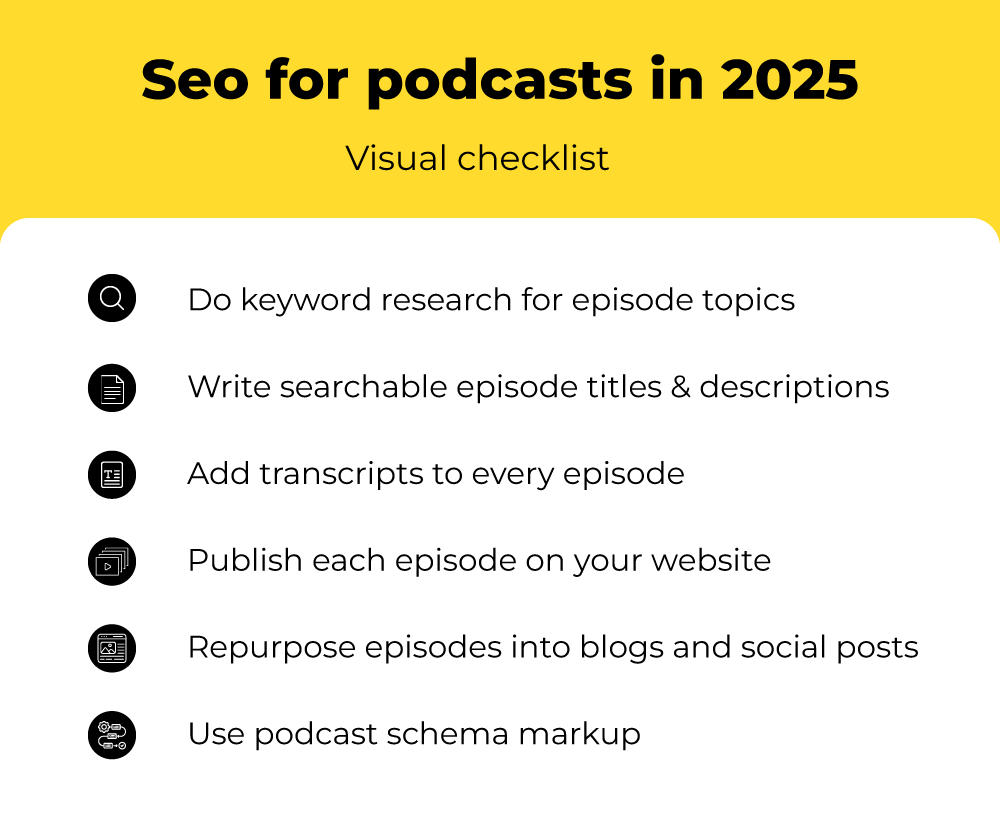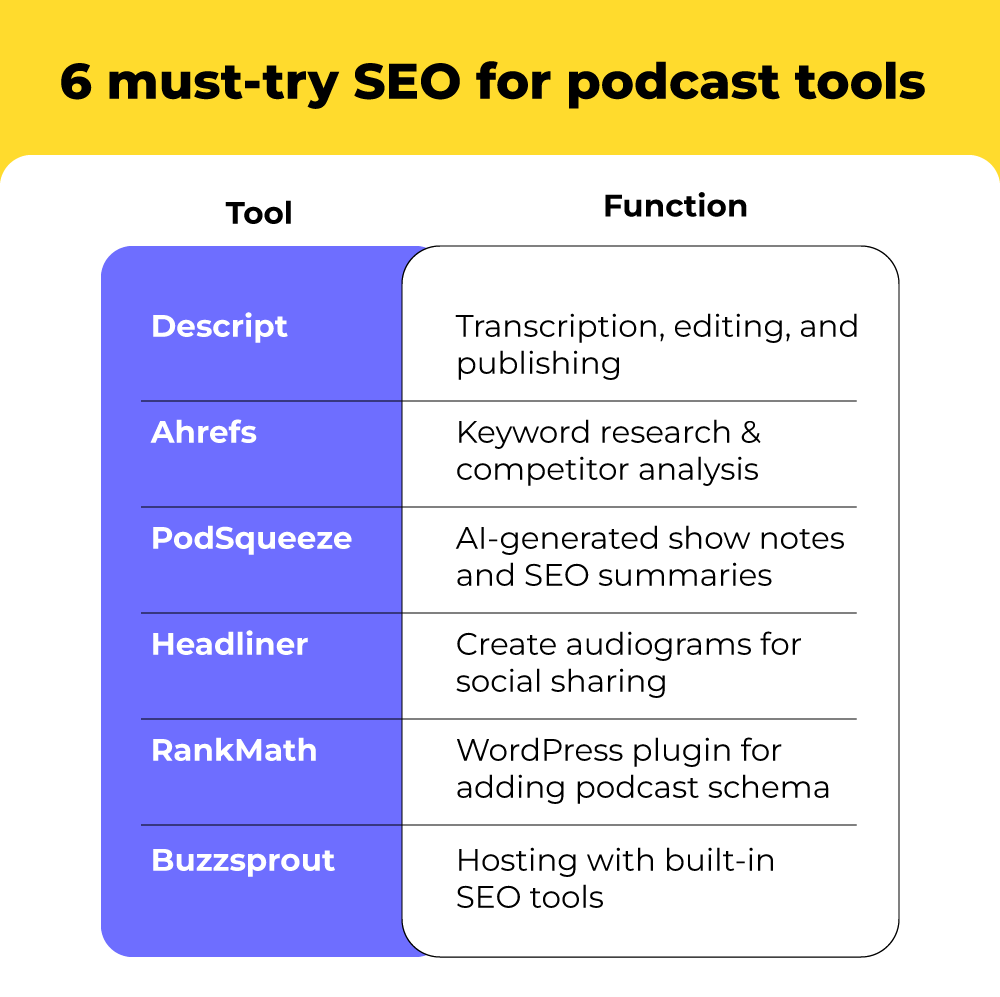So, you’ve recorded your podcast, edited it to perfection, uploaded it to Spotify and Apple Podcasts, and even promoted it on social media. Yet… crickets.
Hardly any organic growth, minimal engagement, and you’re starting to wonder: Why is my podcast not showing up on Google?
You’re not alone. Thousands of podcasters face the same dilemma, especially now in 2025, when podcasting has evolved from a hobby to a powerful business and branding tool. And here’s the missing piece most creators overlook: SEO.
Search engine optimization isn’t just for blogs and websites anymore; it’s now one of the most powerful tools to make your podcast discoverable by the right audience.
With over 13 years of rich and varied experience in digital marketing, our blog serves as your ultimate guide to podcast SEO, covering what it is, why it matters, and how to implement it without requiring technical expertise.
Let’s dive into it, one step at a time.

Why SEO matters for podcasts in 2025
Podcasting is booming. As of 2025, over 464 million people listen to podcasts globally. With this popularity comes, yep, you guessed it, competition.
Think of podcast platforms as search engines themselves. But even better? Now, Google and Bing index podcasts just like they do blogs. That means your audio content can show up in search results, but only if it’s optimized properly.
Add voice search to the mix, and the game changes even more.
As of 2025:
So, when someone says, “Hey Siri, play a podcast about real estate investing,” the question becomes: Will your podcast show up, or will it be your competitor’s?
Understanding how Google “hears” your podcast
This is where most podcasters go wrong; they assume Google can listen to their audio and know what it’s about.
In reality, Google can’t (yet) comprehend audio on its own. It needs help. It needs:
- Textual content (like transcripts and show notes)
- Metadata (episode titles, tags, descriptions)
- Structured data (using schema markup)
And today, thanks to AI and improved indexing technology, Google has become even more adept at recognizing optimized audio content. But it still needs you to do your part.
Step-by-step: How to optimize your podcast for SEO in 2025

On that note, let’s explore the measures you can take to optimize your podcast for SEO.
1. Start with smart keyword research (Yes, even for audio!)
Just like with blog posts, you want to identify what people are actually searching for.
For example, instead of naming your episode “Let’s Talk Funnels,” try “How to Build a Sales Funnel That Converts in 2025.”
Here are some tools you could try:
- Ahrefs: Great for identifying long-tail keywords
- PodSqueeze: Built specifically for podcasters, it even suggests episode titles!
- Answer the Public: Shows questions people ask about your topic
We recommend using conversational phrases. Consider phrases like “how to start a podcast” or “best investing podcasts 2025,” as these are more voice-search friendly.
2. Write keyword-rich episode titles and descriptions
Once you have your keywords, use them naturally in episode titles, show notes, podcast description, and social media captions
Steer clear of keyword stuffing; instead, write like you’re talking to a human. For example:
Before: “Investing tips podcast episode 10 money strategies investing beginner”
After: “Episode 10: Beginner-Friendly Investing Strategies to Grow Your Money in 2025”
3. Provide full transcripts (And actually use them)
This is a game-changer, as uploading a full transcript of your episode creates thousands of words of crawlable content. This gives Google something to read, index, and rank.
Here are some of the best tools in 2025:
We recommend breaking transcripts into sections with headers like a blog. Add timestamps as it improves both readability and SEO.
4. Host podcast pages on your website
Don’t rely solely on Spotify or Apple Podcasts. You need your own branded podcast landing page, ideally, one page per episode.
Wondering why?
Well, because it gives you control over SEO. You can optimize meta tags and earn backlinks to your own site.
Each episode page should include:
- Embedded audio player
- Transcript
- Summary/show notes
- Related blog links
- CTAs to subscribe or contact
5. Promote through blogs & repurpose strategically
After publishing your podcast, you could repurpose it into a blog post, a LinkedIn article, an email newsletter, or short clips for YouTube or TikTok (with captions).
For example, A 45-minute podcast can become:
- 1 blog (1,200+ words)
- 3 social media posts
- 5 video snippets
- 1 lead magnet
And of course, endless SEO juice
Repurposing enhances discoverability and extends the lifespan of your content.
6. Use podcast schema markup
Schema markup is a type of structured data that helps Google understand your content. Adding podcast schema makes your episodes eligible to appear in rich results like:
- Audio snippets
- Google Podcasts carousel
- Voice search playback results
You can add this through your CMS using tools like Schema App or plugins like RankMath.
Podcast SEO tools you should try
We now recommend perusing and exploring some tools that make SEO for podcasts a whole lot simpler.

Common mistakes podcasters make (And how to fix them)
You might have the best storytelling skills and the coolest, most relevant content for your podcast on the virtual block, but you risk losing it all if you make the following mistakes;
- Uploading audio without any text: We recommend always adding a transcript or show notes.
2. Boring or vague episode titles: Try being more specific and keyword-rich.
3. Skipping the website: It is recommended to host your episodes on your site to maximize SEO.
4. Not repurposing content: When you choose not to repurpose your content, you give up the extra reach! Don’t do that; instead, reformat your content into blog posts, videos, and social snippets to grab those extra pairs of eyeballs.
5. Ignoring schema markup: When you incorporate schema markup, you make your podcast eligible for rich search results.
FAQs: Everything you wanted to know about podcast SEO
1. Can podcasts rank on Google?
Absolutely. Podcasts can and do rank on Google, especially since the search giant has been prioritizing rich media results like audio and video since 2019. In fact, Google began indexing individual podcast episodes and displaying them directly in search results (alongside playable buttons) through its Google Podcasts platform.
To get your podcast ranking, you’ll need:
- SEO-optimized episode titles and descriptions
- Embedded transcripts
- Structured data (schema markup for podcasts)
- Consistent publishing and hosting on recognized platforms like Spotify, Apple Podcasts, and Google Podcasts
Pro tip: Make sure your RSS feed is submitted to Google Podcasts Manager to increase discoverability.
2. What’s the best way to transcribe audio for SEO?
Transcribing your episodes is no longer optional; it’s essential. Podcasts are audio-first, but search engines are text-first. That means unless you convert your audio into readable text, Google won’t fully understand your content.
Here are a few top tools for podcast transcription in 2025:
- Descript – Combines transcription, audio editing, and video editing in one interface.
- Otter.ai – Known for its real-time transcription and collaboration features.
- Sonix – AI-powered with support for over 40 languages, timestamps, and speaker labeling.
Once transcribed, you can:
- Embed the full transcript below each episode on your site.
- Add timestamps and headers for a better user experience.
- Use parts of it for repurposed blog posts or social snippets.
3. How important are keywords for podcast SEO?
Keywords are the backbone of any SEO strategy, and podcast SEO is no exception. But here’s the twist: unlike written content, your keywords need to serve two audiences, listeners and search engines.
Focus on:
- Long-tail, conversational keywords (e.g., “best marketing podcasts for small businesses 2025”)
- Industry-specific terms your audience is already Googling
- Episode-specific terms to match user intent
Use tools like Ahrefs, SEMrush, or AnswerThePublic to find relevant podcast-friendly keyword ideas.
4. Should I host my podcast on multiple platforms?
Yes! Distributing your podcast across multiple directories (Spotify, Apple, Amazon Music, Google Podcasts, iHeartRadio) significantly increases your reach and discoverability. Every listing is another chance to appear in search results.
Also, ensure:
- Your show has consistent branding (same title, artwork, and descriptions)
- You optimize metadata on each platform
- Your RSS feed is up-to-date and valid
According to Buzzsprout’s Podcast Industry Stats (2025), Apple Podcasts dominates the market with 37.5% of total podcast listeners globally. So if you’re not listed there, you’re missing a big chunk of your audience.
The road ahead
Did you know that your podcasts can also be a backlink goldmine? If not, we recommend reading ~ Podcast Link Building Made Simple: The Marketers’ Guide to Growing Your SEO Authority.


Samudra Chakravorty - Subject Matter Expert
Samudra Chakravorty is an experienced SEO professional with over 5 years of expertise in enhancing online visibility. He specialises in developing data-driven SEO strategies that improve website rankings, drive organic traffic, and support long-term digital growth.
Naina Sandhir - Content Writer
A content writer at Mavlers, Naina pens quirky, inimitable, and damn relatable content after an in-depth and critical dissection of the topic in question. When not hiking across the Himalayas, she can be found buried in a book with spectacles dangling off her nose!
How to Nail On-Page SEO for SaaS Websites (And Leave Your Competitors Behind)
Iterable Nova: An Early Look into Iterable’s New AI Agent